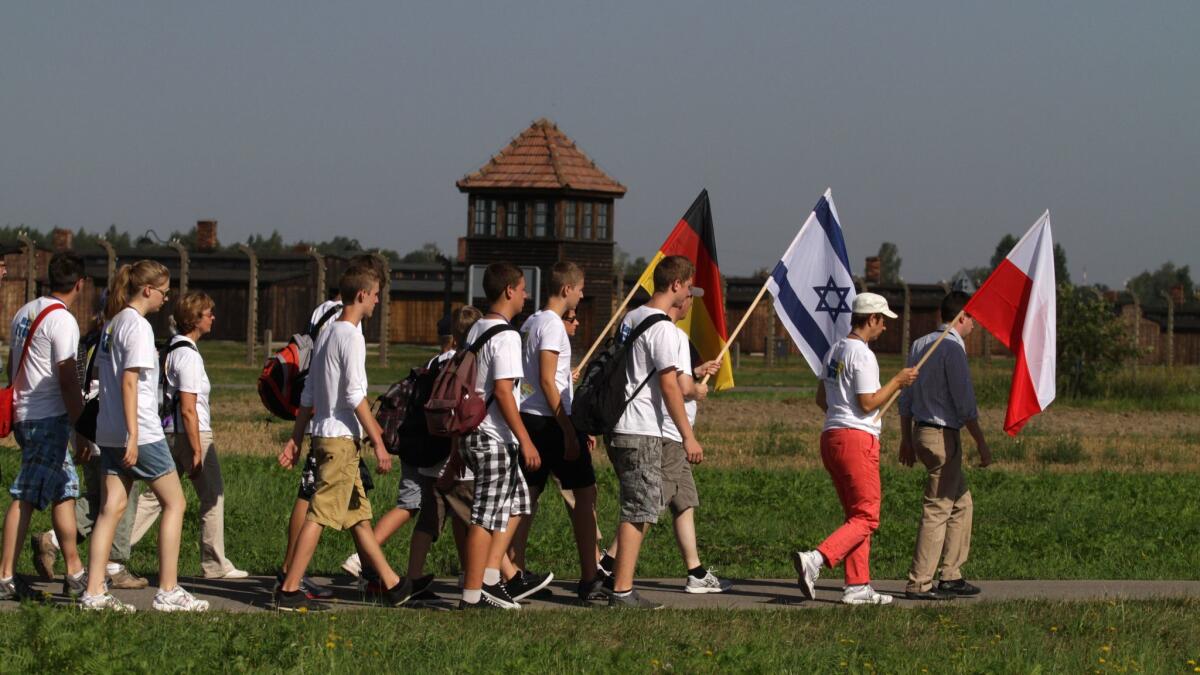Israel pushes back against Polish proposal that rejects culpability for Holocaust

Reporting from Jerusalem — There are probably many ways Poland’s chargé d’affaires to Israel imagined enjoying his Sunday morning in Tel Aviv.
Instead, Piotr Kozlowski spent a blustery Sunday — the first day of Israel’s workweek — in Jerusalem, on the receiving end of an angry reprimand from the Israeli government.
A bill passed by the lower house of Poland’s parliament Friday that would make it illegal to utter the phrase “Polish concentration camp” or to assign Poland culpability for Nazi crimes committed on its soil has infuriated the Israeli government.
The bill requires the approval of the Senate and the nation’s president before becoming law.
It was endorsed by the lower house Jan. 26, the eve of International Holocaust Remembrance Day, which falls on the anniversary of the liberation of Auschwitz-Birkenau, the largest Nazi concentration camp in Poland. Approximately 1 million people were killed there between 1940 and 1945, the vast majority of them Jews.
Poland, the first country to fall to Nazi troops in World War II, has long been sensitive about the crimes carried out by Germany on its soil — in many cases with the complicity of Poles, who were both victims of and, in some cases, collaborators with the Nazis.
In Israel, where tens of thousands of elderly Holocaust survivors are a permanent reminder of the European genocide, the passage of the bill caused an uproar.
“The law’s intent is by no means to whitewash history, but to safeguard it and the truth about the Holocaust, as well as to prevent its distortion,” Kozlowski said.
Israeli Prime Minister Benjamin Netanyahu denounced the “baseless” law and instructed Israel’s ambassador in Warsaw to transmit his condemnation to the Polish prime minister, Mateusz Morawiecki.
In a phone call late Sunday, the two leaders agreed to open an “immediate dialogue” to come to an understanding about the bill, which Morawiecki supports. The law establishes prison terms of up to three years for any mention of “Polish extermination camps.”
Gil Paran, the chairman of a group of Israeli guides of Holocaust tours to Poland, published a letter inquiring “if, as I guide, I mention the part played by Polish people in Holocaust crimes, does this break the law?”
Quoting former Polish President Aleksander Kwaśniewski, Israeli President Reuven Rivlin said: “One cannot fake history; one cannot rewrite it; one cannot hide the truth. Every crime, every offense must be condemned, denounced — must be examined and exposed.
“Only 73 years have passed since the gates of hell were flung open,” Rivlin continued. “Living Holocaust survivors are disappearing from the world, and we still have to fight for the memory of the Holocaust as it was.”
The crisis has made public a fundamental difference between two countries for whom the Holocaust is intimate and personal.
On Twitter, Morawiecki posted that “Jews, Poles, and all victims should be guardians of the memory of all who were murdered by German Nazis. Auschwitz-Birkenau is not a Polish name, and Arbeit Macht Frei” — the infamous slogan above the Auschwitz gate, meaning “work sets you free” — “is not a Polish phrase.”
Holocaust Remembrance Day was marred by a remarkable exchange between the Polish Embassy in Tel Aviv and Yair Lapid, the leader of an Israeli centrist opposition party and the Israeli-born son of a Holocaust survivor.
“I utterly condemn the new Polish law which tries to deny Polish complicity in the Holocaust,” Lapid tweeted. “It was conceived in Germany but hundreds of thousands of Jews were murdered without ever meeting a German soldier. There were Polish death camps and no law can ever change that.”
The Polish Embassy replied, “Your unsupportable claims show how badly Holocaust education is needed, even here in Israel,” adding that Lapid was “shameless.”
Lapid, whose name, adopted by his father after the Holocaust, means flame, replied: “My grandmother was murdered in Poland by Germans and Poles. I don’t need Holocaust education from you. We live with the consequences every day in our collective memory. Your embassy should offer an immediate apology.”
As the Twitter feud escalated, Polish feeds adopted the hashtag #GermanDeathCamps to reflect the long-held Polish belief that Poland, invaded by Nazi Germany, bears no responsibility for the Nazi massacres that took place on its territory.
This is not the first time Poland’s resentment has affected diplomatic ties. In 2012, President Obama was forced to apologize for mentioning “Polish death camps” when awarding the late Polish resistance hero Jan Karski a Presidential Medal of Freedom.
In a tweet posted Sunday, Morawiecki resorted to a metaphor to transmit the Polish view of history: “A gang of professional thugs enters a two-family house. They kill the first family almost entirely. They kill the parents of the second, torturing the kids. They loot and raze the house. Could one, in good conscience, say that the second family is guilty for the murder of the first?”
“What this new law is trying to cover up,” Havi Dreifuss, a Tel Aviv University expert on Polish-Jewish relations during the Holocaust, told the Israeli newspaper Haaretz, is that “during the Holocaust, in quite a few small communities in the Lomza district of Poland, the locals murdered their Jewish neighbors. And Kielce,” a city in which 42 Jewish refugees were killed by their Polish neighbors immediately after World War II, “was not the only place where Jews — some of them sole survivors of their families — were murdered by Poles after the war ended.”
Tarnopolsky is a special correspondent.
ALSO
Study in contrasts: Trump meets with British leader May, then Israel’s Netanyahu
Fossil found in Israeli cave may change the story of human migration out of Africa
Pence’s formula for survival: Praise Trump and act as a pincushion for angry allies
More to Read
Sign up for Essential California
The most important California stories and recommendations in your inbox every morning.
You may occasionally receive promotional content from the Los Angeles Times.










